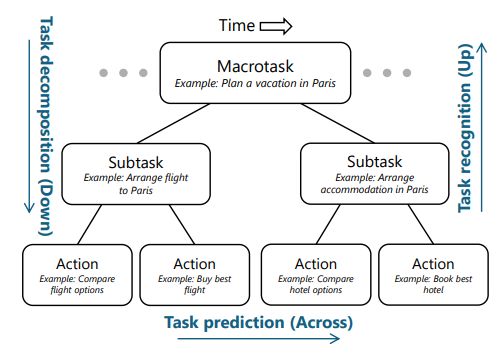This paper is available on arxiv under CC 4.0 license.
Authors:
(1) Ryen W. White, Microsoft Research, Redmond, WA, USA.
Table of Links
Abstract and Taking Search to task
The Undiscovered Country and References
ABSTRACT
As many of us in the information retrieval (IR) research community know and appreciate, search is far from being a solved problem. Millions of people struggle with tasks on search engines every day. Often, their struggles relate to the intrinsic complexity of their task and the failure of search systems to fully understand the task and serve relevant results [58]. The task motivates the search, creating the gap/problematic situation that searchers attempt to bridge/resolve and drives search behavior as they work through different task facets. Complex search tasks require more than support for rudimentary fact finding or re-finding. Research on methods to support complex tasks includes work on generating query and website suggestions [21, 62], personalizing and contextualizing search [4], and developing new search experiences, including those that span time and space [1, 64]. The recent emergence of generative artificial intelligence (AI) and the arrival of assistive agents, or copilots, based on this technology, has the potential to offer further assistance to searchers, especially those engaged in complex tasks [41, 61]. There are profound implications from these advances for the design of intelligent systems and for the future of search itself. This article, based on a keynote by the author at the 2023 ACM SIGIR Conference, explores these issues and charts a course toward new horizons in information access guided by AI copilots.
ACM Reference Format:
Ryen W. White. 2023. Navigating Complex Search Tasks with AI Copilots. Under review at REDACTED. October, 2023
1 TAKING SEARCH TO TASK
Tasks are a critical part of people’s daily lives. The market for dedicated task applications that help people with their “to do” tasks is likely to grow significantly (effectively triple in size) over the next few years.[1] There are many examples of such applications that can help both individuals (e.g., Microsoft To Do, Google Tasks, Todoist) and teams (e.g., Asana, Trello, Monday.com) tackle their tasks more effectively. Over time, these systems will increasingly integrate AI to better help their users capture, manage, and complete their tasks [60]. In information access scenarios such as search, tasks play an important role in motivating searching via gaps in knowledge and problematic situations [3, 15]. AI can be central in these search scenarios, too, especially in assisting with complex search tasks.

1.1 Tasks in Search
Tasks drive the search process. The IR and information science communities have long studied tasks in search [42] and many information seeking models consider the role of task directly [3, 15]. Prior research has explored the different stages of task execution (e.g., pre-focus, focus formation, post-focus) [53], task levels [39], task facets [29], tasks defined on intents (e.g., informational, transactional, and navigational [8]; well-defined or ill-defined [23]; lookup, learn, or investigate [32]), the hierarchical structure of tasks [68], the characteristics of tasks, and the attributes of task searcher interaction, e.g., task difficulty and, of course, a focus in this article, task complexity [11, 26].
As a useful framing device to help conceptualize tasks and develop system support for them, tasks can be represented as trees comprising macrotasks (high level goals), subtasks (specific components of those goals), and actions (specific steps taken by searchers toward the completion of those components) [42]. Figure 1 presents an example of a “task tree” for a task involving an upcoming vacation to Paris, France. Examples of macrotasks, subtasks, and actions are included. Moves around this tree correspond to different task applications such as task recognition (up), task decomposition (down), and task prediction (across). Only actions (e.g., queries, clicks, and so on) are directly observable to traditional search engines. However, with recent advances in search copilots (more fully supporting natural language interactions via language understanding and language generation), more aspects of macrotasks and subtasks are becoming visible to search systems and more fully understood by those systems. Challenges in working with tasks include how to represent them within search systems, how to observe more task-relevant activity and content to develop richer task models, and how to develop task-oriented interfaces that place tasks and their completion at the forefront of user engagement. Task complexity deserves a special focus in this article given the challenges that searchers can still face with complex tasks and the significant potential of AI to help searchers tackle complex tasks.
1.2 Complex Search Tasks
Recent estimates suggest that half of all Web searches are not answered.[2] Many of those searches are connected to complex search tasks. These tasks are ill-defined and/or multi-step, span multiple queries, sessions, and/or devices, and require deep engagement with search engines (many queries, backtracking, branching, etc.) to complete them [21]. Complex tasks also often have many facets and cognitive dimensions, and are closely connected to searcher characteristics such as domain expertise and task familiarity [38, 58].
To date, there have been significant attempts to support complex search tasks via humans (e.g., librarians, subject matter experts) and search systems (both general Web search engines and those tailored to specific industry verticals or domains). The main technological progress so far has been in areas such as query suggestion and contextual search, with new experiences also being developed that utilize multiple devices, provide cross-session support, and enable conversational search. We are now also seeing emerging search-related technologies in the area of generative AI [35].
Before proceeding, let us dive into these different types of existing and emerging search support for complex tasks in more detail.
• Suggestions, personalization, and contextualization: Researchers and practitioners have long developed and deployed support such as query suggestion and trail suggestion, e.g., [21, 45], including providing guided tours [51] and suggesting popular trail destinations [62] as ways to find relevant resources. This coincides with work on contextual search and personalized search, e.g., [4, 47, 63], where search systems can use data from the current searcher such as session activity, location, reading level, and so on, and the searcher’s long-term activity history, to provide more relevant results. Search engines may also use cohort activities to help with cold-start problems for new users and augment personal profiles for more established searchers [48, 69].
• Multi-device, cross-device, and cross-session: Devices have different capabilities and can be used in different settings. Multidevice experiences, e.g., [64], utilizing multiple devices simultaneously to better support complex tasks such as recipe preparation, auto repair, and home improvement that have been decomposed into steps manually or automatically [73]. Cross-device and cross-session support [1, 56] can help with ongoing/background searches for complex tasks that persist over space and time. For example, being able to predict task continuation can help with “slow search” applications that focus more on result quality than the near instantaneous retrieval of search results [46].
• Conversational experiences and generative AI: Natural language is an expressive and powerful means of communicating intentions and preferences with search systems. The introduction of clarification questions on search engine result pages (SERPs) [71], progress on conversational search [20], and even “conversations” with documents (where searchers can inquire about document content via natural language dialog) [49], enable these systems to engage more fully with searchers to better understand their tasks and goals. There are now many emerging opportunities to better understand and support more tasks via large-scale foundation models such as GPT-4[3] and DALL·E 3,[4] including offering conversational task assistance via chatbots such as ChatGPT.5
All of these advances, and others, have paved the way for the emergence of AI copilots, assistive agents that can help people tackle complex search tasks.
[1] https://www.verifiedmarketresearch.com/product/task-management-softwaremarket/
[2] https://blogs.microsoft.com/blog/2023/02/07/reinventing-search-with-a-new-aipowered-microsoft-bing-and-edge-your-copilot-for-the-web/
[3] https://openai.com/gpt-4
[4] https://openai.com/dall-e-3
[5] https://openai.com/chatgpt

